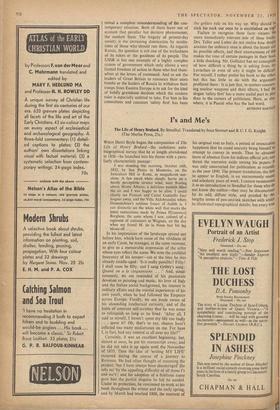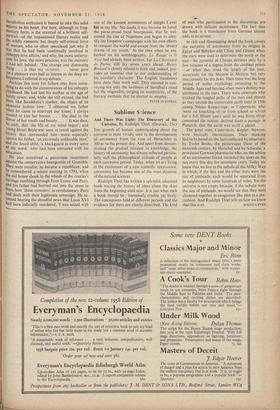I's and Me's
The Life of Henry Brulard. By Stendhal. Translated by Jean Stewart and B. C. J. G. Knight. (The Merlin Press, 25s.) WHEN Henri Beyle began the composition of The Life of Henry Brulard—the ambitious auto- biographical survey that he at length abandoned in 1836—he launched into his theme with a pecu- liarly characteristic passage: I was standing this morning, October 16th, 1832, by Sun Pietro in Montorio, on the Janiculum Hill in Rome, in magnificent sun- shine. A few small white clouds, borne on a barely perceptible sirocco wind, were floating above Monte Albano, a delicious warmth filled the air and I was happy to be alive. I could clearly see Frascati and Castel Gandolfo four leagues away, and the Villa Aldobrandini where Domenichino's sublime fresco of Judith is. I can distinctly see the white wall that marks the latest restorations made by Prince F[rancesco] Borghese, the same whom I saw, colonel of a regiment of cuirassiers at Wagram, on the day when my friend M. de la Noue had his leg
- - blown off. . . .
In his impressions of the landscape spread out before him, which' have some of the vividness of an early Corot, he manages, at the same moment, to give us a memorable impression of the artist whose eyes reflect the scene. We note the youthful buoyancy of his temper—yet at the time he was already middle-aged : 'Is it really possible? Fifty! I shall soon be fifty; and I sang Gretry's song : Quand on a la cinquantaine. . . .' And, simul- taneously, we are reminded of his passionate devotion to painting and music, his love of Italy and the Italian social background, his interest in military affairs and the martial experiences of his own youth, when he had followed the Emperor across Europe. Finally, we are made aware of his abounding intellectual curiosity, and of the habit of constant self-scrutiny that he was never to relinquish so long as he lived : 'After all, I said to myself, I haven't spent my life too badly . . . spent it? Oh, that's to say, chance hasn't inflicted too many misfortunes on me. For have I, in fact, had any control at all over my life?"
Certainly, it was an excellent beginning; but, almost at once, he put his manuscript away; and he did not take it up again until the November of 1835. Then the idea of 'writing MY LIFE' recurred during the course of a journey to Ravenna. He had often thought of resuming the project; 'but I have always been discouraged' (he tells us) 'by the appalling difficulty of all those is and me's% and his adoption of a fictitious name gave him the partial disguise he felt he needed. Under its protection, he continued to work at his book throughout the winter and the early spring, and by March had reached 1800, the moment of his original visit to Italy, a period of intoxicating happiness that he could scarcely bring himself to attempt to convey in words. Then he obtained leave of absence from his tedious official job, and thrust the narrative aside among his papers. It was only resurrected for publication as recently' as the year 1890. The present translation, the first to appear in English, is an uncommonly sound and scholarly piece of work. I cannot recommend it as an introduction to Stendhal for those who do not know the author—they may be disconcerted by its odd, diffuse style, and puzzled by the lengthy series of pen-and-ink sketches with which he illustrated topographical details; but every true Stendhalian enthusiast is bound to take this solid Volume to his heart. For here, although in frag- mentary form, is the material of a brilliant self- Portrait—of the impassioned literary realist and the wildly romantic but deeply self-critical lover of;women, who so often speculated just why it Was that he had been 'continually involved in Unhappy love affairs,' and why, the more unfortu- nate his love, the more precious was the memory it had left behind: 'The strange and distressing thing . . . is that my victories . . . never gave Me a pleasure even half as intense as the deep un- haPpiness I suffered in my defeats.' Perhaps this taste for fAure may have some- thing to do with the circumstances of his unhappy childhood. He had lost his mother at the age of barely seven; and, while she still existed, she had peen, like Baudelaire's mother, the object of an obsessive jealous love: 'I abhorred my father When he came to interrupt our kisses. I always wanted to kiss her bosom. . . . She died in the flower of her youth and beauty ' It was then, he adds, that 'the life of my mind began'; and Young Henri Beyle was soon in revolt against the society that surrounded him—more especially against his father, 'an extremely unlikeable man,' and the Jesuit abbe, 'a blackguard in every sense of the word,' who had been entrusted with his education.
He also conceived a passionate resentment against the conservative bourgeoisie of Grenoble. ,TheY were royalist; he became a republican; and he remembered a winter evening in 1793, when the old house shook to the wheels of the courier's carriage rumbling through from Lyons and Paris, and his father had hurried out into the street to learn how 'those monsters' in revolutionary Paris had dealt with their legitimate sovereign. He re- turned bearing the dreadful news that Louis XVI had been judicially murdered; 'I was seized with one of the keenest movements of delight 1 ever felt in my life.' No doubt it was because he hated 'the purse-proud local bourgeoisie, that he wel- comed the rise of Napoleon and began to iden- tify the Emperor's campaignS with his own efforts to conquer the world and escape from the 'dreary drama of my youth.' At the time when he em- barked on his autobiography, Le Rouge et le Noir had already been written; but La Chartreuse de Pornre still lay seven years ahead. Henry Brulard is closely related to both and, indeed, pro- vides an essential clue to our understanding of his novelist's character. The English translators have done their work well. They succeed in con- veying not only. the liveliness of Stendhal's mind but the originality, verging on eccentricity, of the literary methods that he elected to employ:
I'ETER QUENNELL















































































 Previous page
Previous page